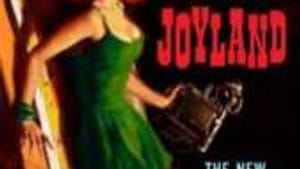Stay in the Loop
BSR publishes on a weekly schedule, with an email newsletter every Wednesday and Thursday morning. There’s no paywall, and subscribing is always free.
How Stephen King pushes my buttons
Stephen King’s ‘Joyland’

As soon as I spotted the lit Ferris wheel glowing in a night sky on the cover of Stephen King’s novel, Joyland, I was hooked. The kid in me is still attracted to amusement parks— the sights, sounds, scents and tastes of a place that “sells fun,” according to the elderly owner of King’s Joyland, Bradley Easterbrook. And my mother— who took my brother and me on those joyful long-ago excursions— was (and still is) every bit as lusciously beautiful as that redhead in the body-hugging green dress in the cover’s foreground.
Helen of Troy had nothing on my ballet-dancing, baton-twirling, homecoming queen mother. To this day, if she bats those jade-green eyes in any man’s direction, the clichéd expression, “putty in her hands,” comes to mind. A good thing for me, considering the times Mom reluctantly put me, at my insistence, on wild rides with names like “The Octopus.” More than once Mom demanded that the operator “stop the ride” before her “baby” passed out from the “fun,” and each time he complied.
I never did ride the Ferris wheel. My mother was afraid of heights and disinclined to watch her daughter being whisked that high into the stratosphere, although this ride is actually so tame that the carnies refer to it as a “chump hoister.” (I loved the carnival lingo in this novel, both real and invented— how it makes the reader feel like an amusement park “insider” as the story unfolds.)
A boy any mother would love
The action in Joyland swirls around Devin Jones, a college student who takes a summer job at Joyland, all the while mooning over a girl so obviously vacuous and superficial that we can’t help but wonder what he ever saw in her in the first place, and why it takes him so long to get over her after she dumps him. But this may be the only piece of this story that didn’t ring true for me— maybe because I’m a girl myself and hate to think of such a great guy being so resoundingly suckered.
And Devin is, without a doubt, a great guy— the perfect protagonist for King’s novel: naÓ¯ve, intelligent and full of heart, a boy any mother would quickly adopt and any girl with brains and a pulse would fall for. The kids at Joyland are crazy about him, particularly when he wears “the fur” (you must read the book to find out exactly what that means).
Thus Devin’s winsome charm lures us into the world of Joyland, where even the gruesome murder of a young woman in the Horror House years before young Devin arrives on the scene doesn’t stop the fun. What would a Stephen King novel be without the ghost of someone or something hovering in the background?
Nostalgic narratives
Every character (except the aforementioned fickle girlfriend) in this novel is wonderfully realized, including Devin’s two summer sidekicks, Erin and Tom, his fellow amusement park employees, and the dying child possessed of psychic abilities as well as an aloof but compellingly beautiful mother.
King is a natural-born storyteller, and by creating characters so true to life he makes it easy for us to suspend our disbelief about the macabre events that occur around them. I’ve long been a pushover for his powerfully nostalgic narratives that take us back to moments we’ve cherished in our own lives. King is keenly aware, as he reminds us, that “when it comes to the past, everyone writes fiction.” No matter: Joyland may be a crime novel, but it definitely pushed a few of my happy buttons.
Familiar faces
Devin, for example, appeals to me because he reminds me of my brother, Tommy, who was killed in a freak accident when he was about Devin’s age. All young men, real or fiction, remind me of my brother in some ways, which makes me instinctively want to protect and care for them—much like the various women who offer Devin sage advice or step in to save him when he can’t save himself.
If mothers (and women with maternal instincts) could save everyone, there would be no crime novels or indeed, crime novelists— although I would gladly read nothing but soup can labels for the rest of my life if doing so would bring my brother back. Of course, if Stephen King wrote the labels, soup would fly off the shelves. I loved every twirl, spin, lift and scream of Joyland’s wild ride, and I actually made it to the end of the book without my mother having to charm the operator to let me off, even once.
Helen of Troy had nothing on my ballet-dancing, baton-twirling, homecoming queen mother. To this day, if she bats those jade-green eyes in any man’s direction, the clichéd expression, “putty in her hands,” comes to mind. A good thing for me, considering the times Mom reluctantly put me, at my insistence, on wild rides with names like “The Octopus.” More than once Mom demanded that the operator “stop the ride” before her “baby” passed out from the “fun,” and each time he complied.
I never did ride the Ferris wheel. My mother was afraid of heights and disinclined to watch her daughter being whisked that high into the stratosphere, although this ride is actually so tame that the carnies refer to it as a “chump hoister.” (I loved the carnival lingo in this novel, both real and invented— how it makes the reader feel like an amusement park “insider” as the story unfolds.)
A boy any mother would love
The action in Joyland swirls around Devin Jones, a college student who takes a summer job at Joyland, all the while mooning over a girl so obviously vacuous and superficial that we can’t help but wonder what he ever saw in her in the first place, and why it takes him so long to get over her after she dumps him. But this may be the only piece of this story that didn’t ring true for me— maybe because I’m a girl myself and hate to think of such a great guy being so resoundingly suckered.
And Devin is, without a doubt, a great guy— the perfect protagonist for King’s novel: naÓ¯ve, intelligent and full of heart, a boy any mother would quickly adopt and any girl with brains and a pulse would fall for. The kids at Joyland are crazy about him, particularly when he wears “the fur” (you must read the book to find out exactly what that means).
Thus Devin’s winsome charm lures us into the world of Joyland, where even the gruesome murder of a young woman in the Horror House years before young Devin arrives on the scene doesn’t stop the fun. What would a Stephen King novel be without the ghost of someone or something hovering in the background?
Nostalgic narratives
Every character (except the aforementioned fickle girlfriend) in this novel is wonderfully realized, including Devin’s two summer sidekicks, Erin and Tom, his fellow amusement park employees, and the dying child possessed of psychic abilities as well as an aloof but compellingly beautiful mother.
King is a natural-born storyteller, and by creating characters so true to life he makes it easy for us to suspend our disbelief about the macabre events that occur around them. I’ve long been a pushover for his powerfully nostalgic narratives that take us back to moments we’ve cherished in our own lives. King is keenly aware, as he reminds us, that “when it comes to the past, everyone writes fiction.” No matter: Joyland may be a crime novel, but it definitely pushed a few of my happy buttons.
Familiar faces
Devin, for example, appeals to me because he reminds me of my brother, Tommy, who was killed in a freak accident when he was about Devin’s age. All young men, real or fiction, remind me of my brother in some ways, which makes me instinctively want to protect and care for them—much like the various women who offer Devin sage advice or step in to save him when he can’t save himself.
If mothers (and women with maternal instincts) could save everyone, there would be no crime novels or indeed, crime novelists— although I would gladly read nothing but soup can labels for the rest of my life if doing so would bring my brother back. Of course, if Stephen King wrote the labels, soup would fly off the shelves. I loved every twirl, spin, lift and scream of Joyland’s wild ride, and I actually made it to the end of the book without my mother having to charm the operator to let me off, even once.
What, When, Where
Joyland. By Stephen King. Hard Case Crime, 2013. 288 pages; $12.95. www.amazon.com.
Sign up for our newsletter
All of the week's new articles, all in one place. Sign up for the free weekly BSR newsletters, and don't miss a conversation.

 Terri Kirby Erickson
Terri Kirby Erickson